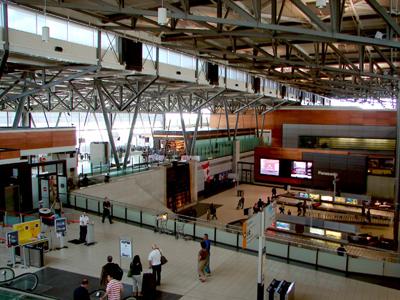
Former Xtra web editor Brent Creelman noticed a series of gay news sites were blocked when he tried to access them at the Ottawa International Airport.
The public WiFi system at Ottawa International Airport restricts access to many gay news sites, including AfterElton, 365gay and Queerty, labelling them as blacklisted adult websites.
Former Xtra web editor Brent Creelman noticed that the sites were blocked while at the airport, returning from a visit to Ottawa on Aug 1.
“I got there early and was on Twitter when something from Queerty popped up. I clicked on it and got that blocked message. I was curious, so I checked the other gay sites,” Creelman says.
Not all gay news sites are blocked on the airport’s system. Xtra.ca is visible, as are several other queer news sites that Creelman tried.
Krista Kealey, the airport’s vice-president of communications, says that there was no intent to block or limit access to gay websites in the airport. She says the airport regulates access to the internet through its WiFi by using a free content-screening system called SquidGuard and a blacklist created at the Université Toulouse in France.
“We don’t discriminate,” Kealey says. “We have clients of all types.”
Kealey suggests that users can update the list themselves if they think a site has been blocked in error.
But the airport’s block message leaves no information about how to report an erroneously blacklisted site.
After complaining to the airport, Creelman says he filed a suggestion to the administrators of the Toulouse list. But Creelman thinks the airport should abandon the blacklist system altogether. The airport’s Porter Lounge, which has its own separate WiFi system, doesn’t restrict access to any sites.
“Why not deal with people accessing porn on a case by case basis, if they’re being inappropriate in the airport?” he asks. “If Porter can have a completely open network, why can’t they do the same?”
Not all Canadian airports restrict access to gay news sites on their WiFi systemns. Neither of Toronto’s airports block access to gay news sites, nor does Calgary’s.
The Toulouse blacklist collection classifies websites into 30 categories, four of which Ottawa Airport has chosen to block: adult, aggressive (hate sites), warez (copyrighted materials) and hacking. However, users can add or remove sites from the list by sending recommendations to the creators at Université Toulouse.
An email address for the Toulouse blacklist creator bounced back Xtra’s emails before press time.
The blacklist is publicly viewable and includes more than one million websites on its “adult” list. Most of the sites are actual porn sites, both gay and straight, but several gay sites have been caught up in the adult sweep.
SquidGuard is an old technology. According to its website, it first appeared in 1998, and the company that created it shut it down in 2006. Mirror sites, like the one run from Université Toulouse, have kept the program alive.
It’s not known how many other institutions use SquidGuard to filter content. However, one SquidGuard web page claims that schools and libraries across the United States use SquidGuard to comply with the federal Children’s Internet Protection Act, which requires public institutions to install screening devices to prevent minors from accessing “harmful material” on the internet in order to receive discounted telecommunications rates.
This isn’t the first time a public corporation in Canada has been caught blocking access to legitimate websites on its public servers. In February, the CBC reported that BC Ferries restricts access to sex education and abortion information on its public WiFi and internet systems.


 Why you can trust Xtra
Why you can trust Xtra


